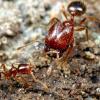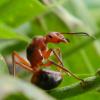Yes, They've been introduced to places where they don't belong like humans - just like most invasive animals.
Does that make them inherently bad? No.
Will they wipe out almost any native ant species anyway? Definitely yes.
Can this completely obliterate an existing ecosystem in a catastrophic chain reaction? Absolutely yes - it may take a while (at least some decades, often centuries) but it wouldn't be the first time that for example woodland ecosystems collapsed and turned broken wastelands with a fraction of the original biodiversity (and while this doesn't apply so much to invicta Argentines are the only ant species that managed to establish itself in the untouched hawaiian moist forest and nobody can really foresee the damage they will cause there in the near and not-so-near future).
Do those invasive "problem cases" need to be removed (probably impossible) or at least be controlled (possibly doable) anyway? Yes, if we want to conserve the existing ecosystems which often are beneficial, in the long run possibly even critical, to our own survival as a species.
p.s. There are rare cases in which an invasive animal can actually enrich a specific ecosystem.
This usually happens if some disaster or drastic climate change wiped out most of the native biosphere and the survivors simply hadn't time to fill certain niches or the ecosystem got wiped out entirely (happened in some places during the ice age, for example in the eastern mediterranean seas) and the new inhabitants that wandered in from other climate zones (like the colder western mediterranian sea) aren't well-equipped to handle the conditions of this particular area of land or sea.
Examples of this would be species from the indian ocean passing the Suez canal into the mediterranean sea because of of the six day war (which lead to a specific species of jellyfish at one point accounting for 99.9% (!) of the entire biomass of the southern mediterranian sea but their population balanced out in the following years) or Pablo Escobar's escaped Hippos improving Columbia's river ecosystems by taking the vacant role of large herbivores and cutting down thick plant carpets, improving water flow and fertilizing the soil with their poop.
Argentines and RIFA definitely aren't one of those cases though.
Edited by Serafine, June 15 2020 - 7:43 AM.

















